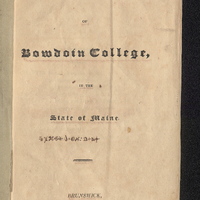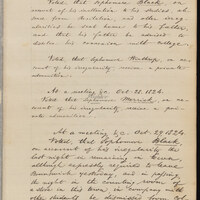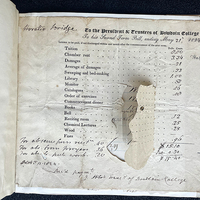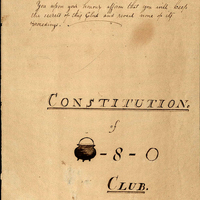
Bored
The sixty or so Laws of Bowdoin College—regularly updated by the College’s conservative Executive Government—with their emphasis on obedience, civility, and discipline prescribed appropriate and expected behavior for the student body in the 1820s. Students, though, seem to have regarded them as much as an invitation for misbehavior as a prescription for how to conduct themselves.
While most infractions were of a rather benign nature, such as playing cards, taking long walks on Sunday, hunting, and setting bonfires, other student high jinks reached the absurd. In April 1823, a student drank an excess of egg posset (an alcoholic drink similar to eggnog) and became violently ill at Sunday service, attracting the ire of the preacher and according to Henry Wadsworth Longfellow causing a stir that “literally left the town up in arms.” Another student set off a large torpedo, an explosive device, in Winthrop Hall, blowing out the first-floor windows and disrupting a session of the Executive Government on December 28, 1824.
Pranks born out of adolescent boredom in a small town also forged friendships that lasted lifetimes, intertwined families, influenced careers, and shaped the remarkable individuals these students would become.
Laws of Bowdoin College, in the State of Maine. Printed by Joseph Griffin, 1824.
By the time Nathaniel Hawthorne received this October 1824 edition his senior year, he was more interested in doodling on, rather than reading, the laws. Even as a first year, he had little regard for them. Writing home a few weeks after arriving, he lamented:
“The Laws of the College are not very strict, and they are not half of them obeyed. Some of them are peculiarly repugnant to my feelings, such as, to get up at sunrise every morning to attend prayers, which law the Students make it a custom to break twice a week. But the worst of all is to be compelled to go to meeting every Sunday, and to hear a red hot Calvinist Sermon from the President, or some other dealer in fire and brimstone.”
Records of the Executive Government, 1821-1831. From the Bowdoin College Archives (A01.07.01).
Together, the President and faculty formed the Executive Government, which meted out accolades and punishments in equal measure. The group’s records document student fines for missing recitations, declamations, and prayers; walking on the Sabbath; playing cards; drinking at local taverns; throwing bonfires and other parties; disturbing the peace; and all sorts of other infractions. Particularly egregious incidents are recorded in narrative form with the name of the culprit underlined. Repeat violators risked rustication–being sent off campus to study under a local clergyman–or worse, suspension.
Hawthorne’s name was among the more commonly recorded. In total, he was fined no fewer than 24 times for breaking the Laws of the College. Longfellow 1, that is, Stephen Longfellow, was also a repeat offender.
Horatio Bridge’s Bowdoin College term bills, May 23, 1823 - September 7, 1825. From the Horatio Bridge Papers (M018).
Bridge, who would rise to the rank of Commodore and serve with distinction in the United States Navy, had a less illustrious career at Bowdoin. He fell in with other troublemakers, especially Hawthorne, and found himself frequently fined by the Executive Government. His term bills, which he collected into a scrapbook in 1882, reflect the monetary cost of his misdeeds and enumerate his infractions. He was charged $0.96 for fines at the close of the term in May 1824, not a small amount given that tuition itself was only $8.00. His response to the punishment? He cut the profile of a face in the bill.
Constitution of the Pot-8-O Club, circa 1824. From the Nathaniel Hawthorne Collection (M085).
Among the more humorous and ephemeral social clubs was the Pot-8-O, established by Hawthorne and a handful of other students, whose constitution states thusly:
We the undersigned subscribers being convinced it is beneficial both to the health and understanding of man, to use vegetable diet [sic], and considering that the Potatoe [sic] is nutritious, easy of digestion, and procured with less difficulty and expense than most other vegetables, do hereby agree to form ourselves into an association. . . This Club shall meet once a week at which time an entertainment shall be provided consisting of roasted potatoes, butter, salt, cider or some other mild drink, but ardent spirits shall never be introduced.
Perhaps the emphasis on the rule that spirits shall never be introduced suggests that it was intended to be broken—some have suggested that this was a dining club characterized more by its drinking than much of anything else.




